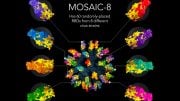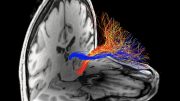
Researchers have developed AI-based tools that can identify subtle speech patterns in schizophrenia patients. This approach, described in a study in PNAS, aims to enhance the diagnostic precision currently relying mainly on patient conversations. In tests involving verbal fluency tasks, the AI model was less predictable in patients with schizophrenia, especially those with severe symptoms. This unpredictability is believed to be connected to ‘cognitive maps’ in the brain. The team aims to further evaluate this technology’s clinical efficacy in the coming years.
Researchers from the UCL Institute for Neurology have created advanced AI-based tools that can characterize subtle signatures in the speech of patients diagnosed with schizophrenia.
The research, published in the journal PNAS, aims to understand how the automated analysis of language could help doctors and scientists diagnose and assess psychiatric conditions.
Currently, psychiatric diagnosis is based almost entirely on talking with patients and those close to them, with only a minimal role for tests such as blood tests and brain scans.
However, this lack of precision prevents a richer understanding of the causes of mental illness, and the monitoring of treatment.
Methodology and Findings
The researchers asked 26 participants with schizophrenia and 26 control participants to complete two verbal fluency tasks, where they were asked to name as many words as they could either belonging to the category “animals” or starting with the letter “p”, in five minutes.
To analyze the answers given by participants, the team used an AI language model that had been trained on vast amounts of internet text to represent the meaning of words in a similar way to humans. They tested whether the words people spontaneously recalled could be predicted by the AI model, and whether this predictability was reduced in patients with schizophrenia.
They found that the answers given by control participants were indeed more predictable by the AI model than those generated by people with schizophrenia and that this difference was largest in patients with more severe symptoms.
Cognitive Maps and Brain Activity
The researchers think that this difference might have to do with the way the brain learns relationships between memories and ideas, and stores this information in so-called ‘cognitive maps’. They find support for this theory in a second part of the same study where the authors used brain scanning to measure brain activity in parts of the brain involved in learning and storing these ‘cognitive maps’.
Lead author, Dr Matthew Nour (UCL Queen Square Institute of Neurology and University of Oxford), said: “Until very recently, the automatic analysis of language has been out of reach of doctors and scientists. However, with the advent of artificial intelligence (AI) language models such as ChatGPT, this situation is changing.
“This work shows the potential of applying AI language models to psychiatry – a medical field intimately related to language and meaning.”
Schizophrenia: Overview and Future Endeavors
Schizophrenia is a debilitating and common psychiatric disorder that affects around 24 million people worldwide and over 685,000 people in the UK.
According to the NHS, symptoms of the condition may include hallucinations, delusions, confused thoughts, and changes in behavior.
The team from UCL and Oxford now plan to use this technology in a larger sample of patients, across more diverse speech settings, to test whether it might prove useful in the clinic.
Dr Nour said: “We are entering a very exciting time in neuroscience and mental health research. By combining state-of-the-art AI language models and brain-scanning technology, we are beginning to uncover how meaning is constructed in the brain, and how this might go awry in psychiatric disorders. There is enormous interest in using AI language models in medicine. If these tools prove safe and robust, I expect they will begin to be deployed in the clinic within the next decade.”
Reference: “Trajectories through semantic spaces in schizophrenia and the relationship to ripple bursts” by Matthew M Nour, Daniel C McNamee, Yunzhe Liu and Raymond J Dolan, 9 October 2023, Proceedings of the National Academy of Sciences.
DOI: 10.1073/pnas.2305290120









Sounds more like a metric of normality, and thinking inside the box. I guess if there’re answers so out of the plausbible categories, one might be able to possibly make such a discernment. However, AI is hardly necessary for that. Schizophrenia is a muddy umbrella term, but it usually entails fragmented thoughts and whatnot. But one could merely be more creative than what the AI is looking for, and that could be flagged as schizophrenic. Having AI be an expert in a field of which we struggle with, especially with regards to parameters, is an implausible approach. Especially with schizophrenia, for various reasons. Not the least of which, is that (at least concerning the US, and numerous other countries I am aware of) even if someone has schizophrenia – so what? It’s not like we typically forcefully lock people who suffer with it anymore. So ultimately, what is the point of this weird plea to AI credentialism?
I agree with you. In fact there are plenty of reasons why someones answers would not be predictable given an internet based understanding of normalcy. Cultural differences for one thing. An AI would only see the average, so most likely only the most conditioned of people (IE. only those who spend most of their time on the internet believing the internet rather than with their own culture) would be considered normal. Also intuiting people are known to be less predictable, so if someone is an INTJ like me does that mean they come up as psychotic on one of these tests?, I don’t know but it is an unsettling thought. Plus humans have a tendency to be mischievous, so they like to play with physiology and or personality tests (or at least I do).
So whether on the scale of a culture or just of an individual, anyone who with an remotely unique or creative mind would be flagged as insane. Sounds more to me like a concept that should be in a early 20th century dystopian novel not here today in our brave new world.
We are getting closer to the Sun, so our Earth gets warmer and oceans rise. But for reasons unknown to the sane, nobody is getting all our cities moved 100metres uphill to compensate for rising ocean levels. Instead New age Idiots imagine we can refreeze the Artic, which is about as likely as a machine gaining the capacity to think, to become conscious, and so be able to diagnose mental illness in us. Computers are inherently unable to assess people, or animals. We are hardly able to do ourselves, else “schizophrenia” would be understood, and I personally fought against my own children even using computers at all, as I foresaw the damage they cause to mental health. Computers make you so stupid you begin to believe them more intelligent than you are: so much so that articles like this are being written by such as who, if mentally healthy, would descry AI’s abilities to do what they claim that possibly it can, and such minds would apply themselves to life in the age of Acquarius instead of hoping to monetize their universities by embarking on projects that are plainly barking!
AS UCL is just down the road from where Hair was staged decades ago, perhaps the writer might consider saving Mankind from The Flood using all available power and energy means to get us all safely rehoused somewhere well above even a tsunami in the new age waters levels!
Schizophrenia is like a nation divided against itself as are university teachers charging for what should be,. and was in their day, a free education, and one that did not constantly waste valuable human resources (i.e. people!) on expensive long-term “research” projects into what they can programme into a machine to con you into believing it both capable & conscious. They are hardly so themselves!